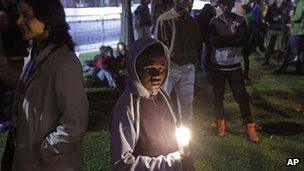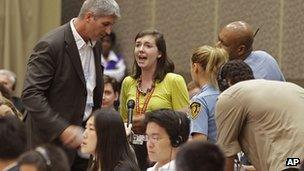Durban: Winners and losers
- Published
- comments

Whether there is light at the end of the tunnel as a result of the summit is a matter of opinion
For some reason that I've not quite figured out, lots of people in the dying embers of this UN climate meeting were asking "who's a winner, and who's a loser?"
There are loads of perhaps more rational questions you could ask, the most pertinent being: "What has this done to curb climate change?"
But what the heck - winners and losers is as good a way as any to set up a quick review of the meeting - so here goes.
Among delegations, there's a rich smorgasbord of winners.
The EU decided to play an active leadership role, looking to drive more ambition in cutting emissions - and it did, staying strong and relatively united throughout.
It didn't get the deal it wanted; but then no-one does in a negotiation.
And it didn't crumble at the last minute, as it has done before, and as the Americans reportedly believed it would this time too.
Countries highly vulnerable to climate impacts notched up a win too.
There are a heck of a lot of them - the Alliance of Small Island States (Aosis) and the Least Developed Countries bloc (LDCs) have more than 70 members combined.
That's enough to block decisions on many issues, not just in the UN climate convention.
If more nations pushing for a strong agreement worked with them, they could become a formidable force; and here, for the first time, the muscles flexed.
US 'quiet man' tactic
Politically, the US had a very good meeting.
With an election looming, President Barack Obama could only lose through having his delegation in the public eye.
Give too much away, and the president would be pilloried for being soft - especially if the parties being given to included China.
But stand out against a tide of other countries trying to move forward on climate change, as happened at the UN meeting in Bali four years ago, and he'd risk alienating more of the supporters who reportedly are already too disillusioned to bother volunteering for his campaign this time round.
The "quiet man" tactics worked perfectly. Canada took most of the heat early on; when ministers arrived, the US was barely visible, and if anyone appeared "hard-line", it was India and China - perfect for the US blame game.
Among nations, no-one emerged a particular loser, though the South African hosts had quite a good go at it.

US envoy Todd Stern's set-piece speech was interrupted by a young heckler
Don't get me wrong. In the ordinary sense, they were great hosts - friendly security guards, decent food, sunny skies, functioning wi-fi, prompt public release of conference documents - only the occasional mugging out in town to spoil the mood.
But in terms of active diplomacy to bring a deal to fruition - no.
"No urgency, no strategy" was a complaint heard too often. And all the host city gets named after it is a "platform" - the Durban Platform for Enhanced Action.
Not a protocol, not a convention, not a mandate; and I'll place a small bet that phrases like "waiting on the Durban Platform" will gain a lot of currency over the next four years at least.
Outside the halls of government, it was a very good meeting for the youth.
Unfailingly charming, youth delegates brought a freshness, a "Yes-we-can" -ness, to the often jaundiced proceedings.
Some of their demonstrations worked too. US envoy Todd Stern was visibly rattled when his set-piece speech was interrupted - not so much rattled by the young heckler as by the prolonged applause generated by her heckling - applause coming from people who were supposed to be her elders and his peers.
And the "occupation" on the final scheduled afternoon made an impact simply because it went on for so long - a couple of hours - bringing a distinct feeling of substance, a "we're staying here until you sort it out" kind of vibe.
Big emitters' cuts
Overall, civil society had a mixed time.
If you haven't been at one of these meetings, it's probably difficult to imagine just how important some civil society representatives are to the process - analysing, assisting, strategising, connecting, conniving, colluding.
The hookup between the EU, Aosis and the LDCs wouldn't have happened without a bit of civil society glue. For those involved in that initiative, it was a triumph.
But for a number of NGOs who stuck rigidly to the "only developed countries must cut emissions" line, it was a bad, bad meeting.
The strategy is perfectly understandable when you think of all the dirty tricks that have gone on in times past on issues such as trade, when developing countries, frankly, needed the protection that came from forming an unbreakable alliance.
Now, there are people on delegations from small developing states who say they need as much protection from the big boys of the developing world as from the traditional foes.
And the argument that "we can't ask the big developing countries to cut their emissions because it'll take pressure off the developed ones" is, again, surely outdated; because it also works in reverse.
When some countries that are officially developing have higher per-capita emissions than some that are developed, it's pretty clear that any sensible route to the global target of limiting temperature rise to 2C (35.6F) has to involve cuts from the rapidly developing big emitters - maybe not right now, but in the not too distant future.
And by their Europhilia, many of the small developing countries indicated that in this context, the old alliance isn't working for them as it once did.
Future potential
And what of the most important player in this whole thing - the planet's biosphere? If it's a sick Gaia, as James Lovelock might say, how high is its temperature now?
In climate change terms, it's certainly no worse off as a result of the Durban meeting.
Whether it's better off depends on whether you prefer your glasses half full or half empty.
A number of analysts think it's a disaster because according to the mainstream projections, the emission pledges countries have made so far will take humanity to a world 4C warmer on average than in pre-industrial times by the end of the century.
And that's an average; some places could see twice that.
Equally, other analysts argue that Durban and its Platform are a triumph, because they give governments a tool with which to adjust direction, setting course for a 2C world.
But remember: all we have is an agreement to negotiate an "instrument" with "legal force".
If governments want to go for a 2C world, they can, by designing the new instrument to match up to the science they all endorse through ownership of the Intergovernmental Panel on Climate Change.
If they don't, we'll see but a minor change of direction and a course still set, if the science is right, for 4C.
It's the negotiations on the new instrument that will determine ultimately whether the biosphere wins or loses from Durban, not Durban itself.
We're waiting on the Platform... darn it, I've done it already...